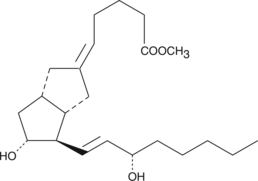Chemicals
Showing 13051–13200 of 41137 results
-
Carbaprostacyclin is a stable analog of prostacyclin (prostaglandin I2) which can activate the prostacyclin receptor or PPARδ.{4061,3321,18709} Carbaprostacyclin methyl ester is a more lipid soluble form of carbaprostacyclin. As a result, it may more readily enter cells to activate PPARδ. The biological activities of carbaprostacyclin methyl ester have not been studied.
Brand:CaymanSKU:9000183 - 5 mgAvailable on backorder
Carbaprostacyclin is a stable analog of prostacyclin (prostaglandin I2) which can activate the prostacyclin receptor or PPARδ.{4061,3321,18709} Carbaprostacyclin methyl ester is a more lipid soluble form of carbaprostacyclin. As a result, it may more readily enter cells to activate PPARδ. The biological activities of carbaprostacyclin methyl ester have not been studied.
Brand:CaymanSKU:9000183 - 500 µgAvailable on backorder
Carbaryl is a carbamate insecticide that inhibits acetylcholinesterase (AChE; IC50 = 13.6 nM for A. gambiae AChE2 expressed in Sf9 cells; Ki = 5.7 µM for rat brain AChE).{39792,39793} Carbaryl administered at a dose of 30 mg/kg for 28 days in rats decreases the weight of spleen and thymus, proliferation of lymphocytes, and serum levels of IL-2, IFN-γ, IL-1β, and TNF-α, and increases the serum levels of IL-4 and IL-10.{39794} It increases CaMKII, GAP-43, and tau protein levels in the hippocampus and tau levels in the cortex of mice 24 hours after administration of doses ranging from 0.5 to 20 mg/kg on postnatal day ten, whereas tau protein levels are decreased four months after administration with no change in CaMKII or GAP-43 compared with control mice. These effects occur at non-toxic doses where acetylcholinesterase is inhibited only during the first six hours following treatment. Formulations containing carbaryl have been used to control insects in agriculture.
Brand:CaymanSKU:24139 - 100 mgAvailable on backorder
Carbasalate calcium is a calcium-urea chelate of aspirin (Item No. 70260) that has analgesic, anti-inflammatory, and antipyretic effects.{53478,53479} It reduces carrageenan-induced paw edema in rats.{53479}
Brand:CaymanSKU:29806 - 1 gAvailable on backorder
Carbasalate calcium is a calcium-urea chelate of aspirin (Item No. 70260) that has analgesic, anti-inflammatory, and antipyretic effects.{53478,53479} It reduces carrageenan-induced paw edema in rats.{53479}
Brand:CaymanSKU:29806 - 10 gAvailable on backorder
Carbasalate calcium is a calcium-urea chelate of aspirin (Item No. 70260) that has analgesic, anti-inflammatory, and antipyretic effects.{53478,53479} It reduces carrageenan-induced paw edema in rats.{53479}
Brand:CaymanSKU:29806 - 5 gAvailable on backorder
Carbasalate calcium is a calcium-urea chelate of aspirin (Item No. 70260) that has analgesic, anti-inflammatory, and antipyretic effects.{53478,53479} It reduces carrageenan-induced paw edema in rats.{53479}
Brand:CaymanSKU:29806 - 500 mgAvailable on backorder
Carbazeran is an inhibitor of phosphodiesterase 2 (PDE2) and PDE3.{47008} It inhibits cAMP hydrolysis (IC50 = 4.1 µM in rabbit heart ventricles) selectively over cGMP hydrolysis (IC50 = 171 µM).{47009} It induces positive inotropic (EC50 = 100 µM) and negative chronotropic effects in isolated rabbit papillary muscle and right atria, respectively. Carbazeran is also a substrate for the enzyme aldehyde oxidase (AOX1), which is involved in the metabolism of xenobiotics.{47010,47011}
Brand:CaymanSKU:26092 - 1 mgAvailable on backorder
Carbazeran is an inhibitor of phosphodiesterase 2 (PDE2) and PDE3.{47008} It inhibits cAMP hydrolysis (IC50 = 4.1 µM in rabbit heart ventricles) selectively over cGMP hydrolysis (IC50 = 171 µM).{47009} It induces positive inotropic (EC50 = 100 µM) and negative chronotropic effects in isolated rabbit papillary muscle and right atria, respectively. Carbazeran is also a substrate for the enzyme aldehyde oxidase (AOX1), which is involved in the metabolism of xenobiotics.{47010,47011}
Brand:CaymanSKU:26092 - 10 mgAvailable on backorder
Carbazeran is an inhibitor of phosphodiesterase 2 (PDE2) and PDE3.{47008} It inhibits cAMP hydrolysis (IC50 = 4.1 µM in rabbit heart ventricles) selectively over cGMP hydrolysis (IC50 = 171 µM).{47009} It induces positive inotropic (EC50 = 100 µM) and negative chronotropic effects in isolated rabbit papillary muscle and right atria, respectively. Carbazeran is also a substrate for the enzyme aldehyde oxidase (AOX1), which is involved in the metabolism of xenobiotics.{47010,47011}
Brand:CaymanSKU:26092 - 5 mgAvailable on backorder
Carbazeran is an inhibitor of phosphodiesterase 2 (PDE2) and PDE3.{47008} It inhibits cAMP hydrolysis (IC50 = 4.1 µM in rabbit heart ventricles) selectively over cGMP hydrolysis (IC50 = 171 µM).{47009} It induces positive inotropic (EC50 = 100 µM) and negative chronotropic effects in isolated rabbit papillary muscle and right atria, respectively. Carbazeran is also a substrate for the enzyme aldehyde oxidase (AOX1), which is involved in the metabolism of xenobiotics.{47010,47011}
Brand:CaymanSKU:26092 - 500 µgAvailable on backorder
Carbendazim is the degradation product and active ingredient of the carbamate fungicide benomyl.{38588,38586} Carbendazim (100 µM) disrupts the growth of S. cerevisiae by inhibiting microtubule polymerization.{38588} It impairs meiosis and steroidogenesis in an ex vivo rat model of seminiferous tubules and increases prostate weight in rats when administered at a dose of 100 mg/kg but does not affect other testosterone-dependent or estrogen-dependent tissues.{38587,38589}
Brand:CaymanSKU:23852 - 100 mgAvailable on backorder
Carbenicillin is a broad-spectrum carboxypenicillin antibiotic.{42909} It is active against Gram-negative and certain Gram-positive bacteria, including S. pyogenes, S. epidermidis, P. mirabilis, P. vulgaris, E. coli, and P. aeruginosa (MICs = 0.19, 1.56, 1.56, 3.12, 3.12, and 50 μg/ml, respectively). It is also active against penicillinase-producing and non-producing strains of S. aureus (MICs = 1.56 and 12.5 μg/ml, respectively). Carbenicillin is protective against systemic S. pyogenes, P. vulgaris, E. coli, and S. aureus infection in a mouse model of systemic lethal infection with 50% protective dose (PD50) values of 7.8, 224, 19.3, and 34 mg/kg, respectively. It also decreases viable colony counts in the kidney in a rat model of P. vulgaris or E. coli urinary tract infection when administered at a dose of 100 mg/kg. Formulations containing carbenicillin have previously been used in the treatment of upper and lower urinary tract infections and prostatitis.
Brand:CaymanSKU:20871 -Out of stock
Carbenicillin is a broad-spectrum carboxypenicillin antibiotic.{42909} It is active against Gram-negative and certain Gram-positive bacteria, including S. pyogenes, S. epidermidis, P. mirabilis, P. vulgaris, E. coli, and P. aeruginosa (MICs = 0.19, 1.56, 1.56, 3.12, 3.12, and 50 μg/ml, respectively). It is also active against penicillinase-producing and non-producing strains of S. aureus (MICs = 1.56 and 12.5 μg/ml, respectively). Carbenicillin is protective against systemic S. pyogenes, P. vulgaris, E. coli, and S. aureus infection in a mouse model of systemic lethal infection with 50% protective dose (PD50) values of 7.8, 224, 19.3, and 34 mg/kg, respectively. It also decreases viable colony counts in the kidney in a rat model of P. vulgaris or E. coli urinary tract infection when administered at a dose of 100 mg/kg. Formulations containing carbenicillin have previously been used in the treatment of upper and lower urinary tract infections and prostatitis.
Brand:CaymanSKU:20871 -Out of stock
Carbenicillin is a broad-spectrum carboxypenicillin antibiotic.{42909} It is active against Gram-negative and certain Gram-positive bacteria, including S. pyogenes, S. epidermidis, P. mirabilis, P. vulgaris, E. coli, and P. aeruginosa (MICs = 0.19, 1.56, 1.56, 3.12, 3.12, and 50 μg/ml, respectively). It is also active against penicillinase-producing and non-producing strains of S. aureus (MICs = 1.56 and 12.5 μg/ml, respectively). Carbenicillin is protective against systemic S. pyogenes, P. vulgaris, E. coli, and S. aureus infection in a mouse model of systemic lethal infection with 50% protective dose (PD50) values of 7.8, 224, 19.3, and 34 mg/kg, respectively. It also decreases viable colony counts in the kidney in a rat model of P. vulgaris or E. coli urinary tract infection when administered at a dose of 100 mg/kg. Formulations containing carbenicillin have previously been used in the treatment of upper and lower urinary tract infections and prostatitis.
Brand:CaymanSKU:20871 -Out of stock
Carbenicillin is a broad-spectrum carboxypenicillin antibiotic.{42909} It is active against Gram-negative and certain Gram-positive bacteria, including S. pyogenes, S. epidermidis, P. mirabilis, P. vulgaris, E. coli, and P. aeruginosa (MICs = 0.19, 1.56, 1.56, 3.12, 3.12, and 50 μg/ml, respectively). It is also active against penicillinase-producing and non-producing strains of S. aureus (MICs = 1.56 and 12.5 μg/ml, respectively). Carbenicillin is protective against systemic S. pyogenes, P. vulgaris, E. coli, and S. aureus infection in a mouse model of systemic lethal infection with 50% protective dose (PD50) values of 7.8, 224, 19.3, and 34 mg/kg, respectively. It also decreases viable colony counts in the kidney in a rat model of P. vulgaris or E. coli urinary tract infection when administered at a dose of 100 mg/kg. Formulations containing carbenicillin have previously been used in the treatment of upper and lower urinary tract infections and prostatitis.
Brand:CaymanSKU:20871 -Out of stock
Carbenoxolone is a derivative of β-glycyrrhetinic acid (Item No. 11845), a major metabolite of glycyrrhizin, one of the main constituents of licorice. Similar to β-glycyrrhetinic acid and glycyrrhizin, carbenoxolone has been shown to exhibit anti-ulcerative and anti-inflammatory properties.{29513} Carbenoxolone inhibits 11β-hydroxysteroid dehydrogenase type 1 (11β-HSD1; Item No. 10007815) conversion of cortisol to cortisone, which contributes to its potential to induce mineralocorticoid hypertension.{11854} It is also reported to inhibit 11β-HSD2 conversion of cortisone to cortisol resulting in improved cognitive and neuroprotective effects.{24097}
Brand:CaymanSKU:-Available on backorder
Carbenoxolone is a derivative of β-glycyrrhetinic acid (Item No. 11845), a major metabolite of glycyrrhizin, one of the main constituents of licorice. Similar to β-glycyrrhetinic acid and glycyrrhizin, carbenoxolone has been shown to exhibit anti-ulcerative and anti-inflammatory properties.{29513} Carbenoxolone inhibits 11β-hydroxysteroid dehydrogenase type 1 (11β-HSD1; Item No. 10007815) conversion of cortisol to cortisone, which contributes to its potential to induce mineralocorticoid hypertension.{11854} It is also reported to inhibit 11β-HSD2 conversion of cortisone to cortisol resulting in improved cognitive and neuroprotective effects.{24097}
Brand:CaymanSKU:-Available on backorder
Carbenoxolone is a derivative of β-glycyrrhetinic acid (Item No. 11845), a major metabolite of glycyrrhizin, one of the main constituents of licorice. Similar to β-glycyrrhetinic acid and glycyrrhizin, carbenoxolone has been shown to exhibit anti-ulcerative and anti-inflammatory properties.{29513} Carbenoxolone inhibits 11β-hydroxysteroid dehydrogenase type 1 (11β-HSD1; Item No. 10007815) conversion of cortisol to cortisone, which contributes to its potential to induce mineralocorticoid hypertension.{11854} It is also reported to inhibit 11β-HSD2 conversion of cortisone to cortisol resulting in improved cognitive and neuroprotective effects.{24097}
Brand:CaymanSKU:-Available on backorder
Carbenoxolone is a derivative of β-glycyrrhetinic acid (Item No. 11845), a major metabolite of glycyrrhizin, one of the main constituents of licorice. Similar to β-glycyrrhetinic acid and glycyrrhizin, carbenoxolone has been shown to exhibit anti-ulcerative and anti-inflammatory properties.{29513} Carbenoxolone inhibits 11β-hydroxysteroid dehydrogenase type 1 (11β-HSD1; Item No. 10007815) conversion of cortisol to cortisone, which contributes to its potential to induce mineralocorticoid hypertension.{11854} It is also reported to inhibit 11β-HSD2 conversion of cortisone to cortisol resulting in improved cognitive and neuroprotective effects.{24097}
Brand:CaymanSKU:-Available on backorder
Carbetapentane is an agonist of the sigma-1 receptor (Ki = 10.4 nM).{25816,21421} It also binds the serotonin 5-HT3 and muscarinic acetylcholine receptors (Kis = 7.9 and 76 nM, respectively).{30163,30164} Carbetapentane is a potent antitussive, anticonvulsant, and spasmolytic agent in clinical trials.{21421,30164}
Brand:CaymanSKU:-Available on backorder
Carbetapentane is an agonist of the sigma-1 receptor (Ki = 10.4 nM).{25816,21421} It also binds the serotonin 5-HT3 and muscarinic acetylcholine receptors (Kis = 7.9 and 76 nM, respectively).{30163,30164} Carbetapentane is a potent antitussive, anticonvulsant, and spasmolytic agent in clinical trials.{21421,30164}
Brand:CaymanSKU:-Available on backorder
Carbetapentane is an agonist of the sigma-1 receptor (Ki = 10.4 nM).{25816,21421} It also binds the serotonin 5-HT3 and muscarinic acetylcholine receptors (Kis = 7.9 and 76 nM, respectively).{30163,30164} Carbetapentane is a potent antitussive, anticonvulsant, and spasmolytic agent in clinical trials.{21421,30164}
Brand:CaymanSKU:-Available on backorder
Carbidopa is a peripherally-restricted inhibitor of dopamine decarboxylase, the enzyme that converts L-DOPA (Item No. 13248) to dopamine.{41269} Carbidopa (100 mg/kg) pretreatment in dog increases the plasma concentration of L-DOPA by 186% and prolongs the half-life in plasma by 48% and skeletal muscle extracellular fluid by 66%.{41270} Carbidopa also binds to and potentiates the activity of the aryl hydrocarbon receptor (AhR), which is a ligand-dependent transcription factor that mediates the toxicity of certain xenobiotics and polyaromatic hydrocarbons.{41271} It inhibits the proliferation of pancreatic cancer cells in vitro and tumor growth in vivo. Formulations containing carbidopa are used in combination with L-DOPA in the treatment of Parkinson’s disease to increase the amount of dopamine in the brain and reduce peripheral side effects associated with L-DOPA administration.
Brand:CaymanSKU:23783 - 100 mgAvailable on backorder
Carbidopa is a peripherally-restricted inhibitor of dopamine decarboxylase, the enzyme that converts L-DOPA (Item No. 13248) to dopamine.{41269} Carbidopa (100 mg/kg) pretreatment in dog increases the plasma concentration of L-DOPA by 186% and prolongs the half-life in plasma by 48% and skeletal muscle extracellular fluid by 66%.{41270} Carbidopa also binds to and potentiates the activity of the aryl hydrocarbon receptor (AhR), which is a ligand-dependent transcription factor that mediates the toxicity of certain xenobiotics and polyaromatic hydrocarbons.{41271} It inhibits the proliferation of pancreatic cancer cells in vitro and tumor growth in vivo. Formulations containing carbidopa are used in combination with L-DOPA in the treatment of Parkinson’s disease to increase the amount of dopamine in the brain and reduce peripheral side effects associated with L-DOPA administration.
Brand:CaymanSKU:23783 - 25 mgAvailable on backorder
Carbidopa is a peripherally-restricted inhibitor of dopamine decarboxylase, the enzyme that converts L-DOPA (Item No. 13248) to dopamine.{41269} Carbidopa (100 mg/kg) pretreatment in dog increases the plasma concentration of L-DOPA by 186% and prolongs the half-life in plasma by 48% and skeletal muscle extracellular fluid by 66%.{41270} Carbidopa also binds to and potentiates the activity of the aryl hydrocarbon receptor (AhR), which is a ligand-dependent transcription factor that mediates the toxicity of certain xenobiotics and polyaromatic hydrocarbons.{41271} It inhibits the proliferation of pancreatic cancer cells in vitro and tumor growth in vivo. Formulations containing carbidopa are used in combination with L-DOPA in the treatment of Parkinson’s disease to increase the amount of dopamine in the brain and reduce peripheral side effects associated with L-DOPA administration.
Brand:CaymanSKU:23783 - 250 mgAvailable on backorder
Carbidopa is a peripherally-restricted inhibitor of dopamine decarboxylase, the enzyme that converts L-DOPA (Item No. 13248) to dopamine.{41269} Carbidopa (100 mg/kg) pretreatment in dog increases the plasma concentration of L-DOPA by 186% and prolongs the half-life in plasma by 48% and skeletal muscle extracellular fluid by 66%.{41270} Carbidopa also binds to and potentiates the activity of the aryl hydrocarbon receptor (AhR), which is a ligand-dependent transcription factor that mediates the toxicity of certain xenobiotics and polyaromatic hydrocarbons.{41271} It inhibits the proliferation of pancreatic cancer cells in vitro and tumor growth in vivo. Formulations containing carbidopa are used in combination with L-DOPA in the treatment of Parkinson’s disease to increase the amount of dopamine in the brain and reduce peripheral side effects associated with L-DOPA administration.
Brand:CaymanSKU:23783 - 50 mgAvailable on backorder
Carbimazole is a prodrug form of the thyroid hormone synthesis inhibitor methimazole (Item No. 23718).{48480} Carbimazole (15 mg/animal) reduces total thyroxine concentration, thyroid enlargement, polyphagia, anorexia, and alopecia in a cat model of hyperthyroidism.
Brand:CaymanSKU:28280 - 10 gAvailable on backorder
Carbimazole is a prodrug form of the thyroid hormone synthesis inhibitor methimazole (Item No. 23718).{48480} Carbimazole (15 mg/animal) reduces total thyroxine concentration, thyroid enlargement, polyphagia, anorexia, and alopecia in a cat model of hyperthyroidism.
Brand:CaymanSKU:28280 - 100 gAvailable on backorder
Carbimazole is a prodrug form of the thyroid hormone synthesis inhibitor methimazole (Item No. 23718).{48480} Carbimazole (15 mg/animal) reduces total thyroxine concentration, thyroid enlargement, polyphagia, anorexia, and alopecia in a cat model of hyperthyroidism.
Brand:CaymanSKU:28280 - 5 gAvailable on backorder
Carbimazole is a prodrug form of the thyroid hormone synthesis inhibitor methimazole (Item No. 23718).{48480} Carbimazole (15 mg/animal) reduces total thyroxine concentration, thyroid enlargement, polyphagia, anorexia, and alopecia in a cat model of hyperthyroidism.
Brand:CaymanSKU:28280 - 50 gAvailable on backorder
Carbinoxamine is a competitive histamine H1 receptor antagonist (Ki = 2.3 nM) and first generation antihistamine.{23220} It also competes with [3H]diltiazem, an L-type calcium channel blocker, for binding to the benzothiazepine site on rat cardiomyocytes (Ki = 1.08 nM).{41288} Carbinoxamine decreases negative inotropic activity in isolated guinea pig left atria by 76% (EC50 = 250 nM) and negative chronotropic activity in guinea pig spontaneously beating isolated right atria by 48% compared with control. Formulations containing carbinoxamine have been used in the treatment of allergic rhinitis.
Brand:CaymanSKU:23937 - 1 gAvailable on backorder
Carbinoxamine is a competitive histamine H1 receptor antagonist (Ki = 2.3 nM) and first generation antihistamine.{23220} It also competes with [3H]diltiazem, an L-type calcium channel blocker, for binding to the benzothiazepine site on rat cardiomyocytes (Ki = 1.08 nM).{41288} Carbinoxamine decreases negative inotropic activity in isolated guinea pig left atria by 76% (EC50 = 250 nM) and negative chronotropic activity in guinea pig spontaneously beating isolated right atria by 48% compared with control. Formulations containing carbinoxamine have been used in the treatment of allergic rhinitis.
Brand:CaymanSKU:23937 - 10 gAvailable on backorder
Carbinoxamine is a competitive histamine H1 receptor antagonist (Ki = 2.3 nM) and first generation antihistamine.{23220} It also competes with [3H]diltiazem, an L-type calcium channel blocker, for binding to the benzothiazepine site on rat cardiomyocytes (Ki = 1.08 nM).{41288} Carbinoxamine decreases negative inotropic activity in isolated guinea pig left atria by 76% (EC50 = 250 nM) and negative chronotropic activity in guinea pig spontaneously beating isolated right atria by 48% compared with control. Formulations containing carbinoxamine have been used in the treatment of allergic rhinitis.
Brand:CaymanSKU:23937 - 5 gAvailable on backorder
CTA2 is a stable analog of TXA2. CTA2 is a potent coronary vasoconstrictor and is effective at concentrations as low as 1 nM in cat coronary arteries.{333} Unlike other vascular TP receptor agonists, CTA2 is a potent inhibitor of prostanoid-induced platelet aggregation. It inhibits arachidonic acid-induced aggregation with an IC50 value of 4-5 µM. CTA2 also exhibits selective and dose-dependent inhibition of TXB2 synthesis in rabbit platelets at concentrations between 1 and 100 µM.{333}
Brand:CaymanSKU:-Available on backorder
CTA2 is a stable analog of TXA2. CTA2 is a potent coronary vasoconstrictor and is effective at concentrations as low as 1 nM in cat coronary arteries.{333} Unlike other vascular TP receptor agonists, CTA2 is a potent inhibitor of prostanoid-induced platelet aggregation. It inhibits arachidonic acid-induced aggregation with an IC50 value of 4-5 µM. CTA2 also exhibits selective and dose-dependent inhibition of TXB2 synthesis in rabbit platelets at concentrations between 1 and 100 µM.{333}
Brand:CaymanSKU:-Available on backorder
CTA2 is a stable analog of TXA2. CTA2 is a potent coronary vasoconstrictor and is effective at concentrations as low as 1 nM in cat coronary arteries.{333} Unlike other vascular TP receptor agonists, CTA2 is a potent inhibitor of prostanoid-induced platelet aggregation. It inhibits arachidonic acid-induced aggregation with an IC50 value of 4-5 µM. CTA2 also exhibits selective and dose-dependent inhibition of TXB2 synthesis in rabbit platelets at concentrations between 1 and 100 µM.{333}
Brand:CaymanSKU:-Available on backorder
CTA2 is a stable analog of TXA2. CTA2 is a potent coronary vasoconstrictor and is effective at concentrations as low as 1 nM in cat coronary arteries.{333} Unlike other vascular TP receptor agonists, CTA2 is a potent inhibitor of prostanoid-induced platelet aggregation. It inhibits arachidonic acid-induced aggregation with an IC50 value of 4-5 µM. CTA2 also exhibits selective and dose-dependent inhibition of TXB2 synthesis in rabbit platelets at concentrations between 1 and 100 µM.{333}
Brand:CaymanSKU:-Available on backorder
Carbofuran is a carbamate insecticide that inhibits acetylcholinesterase (AChE) in insects and mammals (Kas = 9.4, 30, and 210 µM for M. domestica brain, A. mellifera brain, and bovine erythrocyte AChE, respectively).{36349} It also inhibits AChE from rat and human erythrocytes with IC50 values of 40 and 25 nM, respectively.{37694} It is toxic to the housefly M. domestica (LD50 = 4.6 mg/kg) and fourth-instar larvae of the mosquito C. pipiens with an LC50 value of 0.054 ppm. Carbofuran is toxic to birds, rats (LD50 = 4-11 mg/kg), and other mammals including dogs, sheep, and cattle, and is considered an environmental toxin.{36349,36347} Formulations containing carbofuran have been used in agriculture for the control of insects, nematodes, mites, and ticks.
Brand:CaymanSKU:25635 - 100 mgAvailable on backorder
Carbofuran is a carbamate insecticide that inhibits acetylcholinesterase (AChE) in insects and mammals (Kas = 9.4, 30, and 210 µM for M. domestica brain, A. mellifera brain, and bovine erythrocyte AChE, respectively).{36349} It also inhibits AChE from rat and human erythrocytes with IC50 values of 40 and 25 nM, respectively.{37694} It is toxic to the housefly M. domestica (LD50 = 4.6 mg/kg) and fourth-instar larvae of the mosquito C. pipiens with an LC50 value of 0.054 ppm. Carbofuran is toxic to birds, rats (LD50 = 4-11 mg/kg), and other mammals including dogs, sheep, and cattle, and is considered an environmental toxin.{36349,36347} Formulations containing carbofuran have been used in agriculture for the control of insects, nematodes, mites, and ticks.
Brand:CaymanSKU:25635 - 50 mgAvailable on backorder
Carbolactone is a fungal metabolite originally isolated from Sporormiella australis that has fungicidal and herbicidal activities.{53546} It is active against the phytopathogenic fungi U. violacea and E. repens, but not the bacteria B. megaterium or E. coli, when used at concentrations of 6.5, 65, and 650 µg/ml in an agar diffusion assay. Carbolactone also inhibits germination of the cress L. sativum.
Brand:CaymanSKU:29838 - 1 mgAvailable on backorder
Carboplatin is a platinum-based antineoplastic agent that functions by forming DNA adducts specifically in cancer cells, preventing DNA replication and transcription which leads to cell death. It has cytotoxic effects in ovarian, lung, and other cancer cell lines (IC50s = 14-200 μM).{24628,24627} Carboplatin has been widely studied in clinical settings both alone or in combination with other agents to treat various solid tumors.{24626}
Brand:CaymanSKU:-Carboplatin is a platinum-based antineoplastic agent that functions by forming DNA adducts specifically in cancer cells, preventing DNA replication and transcription which leads to cell death. It has cytotoxic effects in ovarian, lung, and other cancer cell lines (IC50s = 14-200 μM).{24628,24627} Carboplatin has been widely studied in clinical settings both alone or in combination with other agents to treat various solid tumors.{24626}
Brand:CaymanSKU:-Carboplatin is a platinum-based antineoplastic agent that functions by forming DNA adducts specifically in cancer cells, preventing DNA replication and transcription which leads to cell death. It has cytotoxic effects in ovarian, lung, and other cancer cell lines (IC50s = 14-200 μM).{24628,24627} Carboplatin has been widely studied in clinical settings both alone or in combination with other agents to treat various solid tumors.{24626}
Brand:CaymanSKU:-Carboplatin is a platinum-based antineoplastic agent that functions by forming DNA adducts specifically in cancer cells, preventing DNA replication and transcription which leads to cell death. It has cytotoxic effects in ovarian, lung, and other cancer cell lines (IC50s = 14-200 μM).{24628,24627} Carboplatin has been widely studied in clinical settings both alone or in combination with other agents to treat various solid tumors.{24626}
Brand:CaymanSKU:-Carboxy-PTIO is a NO scavenger. It reacts stoichiometrically with NO and can be used for EPR detection of NO.{1203,4117}
Brand:CaymanSKU:81540 - 10 mgAvailable on backorder
Carboxy-PTIO is a NO scavenger. It reacts stoichiometrically with NO and can be used for EPR detection of NO.{1203,4117}
Brand:CaymanSKU:81540 - 100 mgAvailable on backorder
Carboxy-PTIO is a NO scavenger. It reacts stoichiometrically with NO and can be used for EPR detection of NO.{1203,4117}
Brand:CaymanSKU:81540 - 5 mgAvailable on backorder
Carboxy-PTIO is a NO scavenger. It reacts stoichiometrically with NO and can be used for EPR detection of NO.{1203,4117}
Brand:CaymanSKU:81540 - 50 mgAvailable on backorder
Carboxyamidotriazole is an orally bioavailable, non-selective calcium channel blocker.{45500} It blocks L- and T-type calcium channels in GH3 rat pituitary cancer cells (IC50s = 0.5 and 1.5 μg/ml, respectively). It also inhibits calcium influx stimulated by the acetylcholine receptor agonist carbachol (carbamoylcholine; Item No. 14486) and the calcium ionophore A23187 (Item Nos. 11016 | 22030) in CHO cells expressing human recombinant muscarinic M5 receptors (IC50s = 935 and 359 nM, respectively).{45501} Carboxyamidotriazole inhibits the growth of T. gondii in non-cancerous human fibroblasts and HeLa human cervical cancer cells (IC50 = 0.06 μg/ml for both).{45502} It inhibits the growth of FaDu and EVSCC17M human squamous cell carcinoma cells (IC50s = 13 and 15 μM, respectively) and of human umbilical vein endothelial cells (HUVECs; IC50 = 1 μM) in vitro.{45503,45504} Carboxyamidotriazole (20 μM) also inhibits angiogenesis in a chicken chorioallantoic membrane assay in vivo.{45504}
Brand:CaymanSKU:28732 - 10 mgAvailable on backorder
Carboxyamidotriazole is an orally bioavailable, non-selective calcium channel blocker.{45500} It blocks L- and T-type calcium channels in GH3 rat pituitary cancer cells (IC50s = 0.5 and 1.5 μg/ml, respectively). It also inhibits calcium influx stimulated by the acetylcholine receptor agonist carbachol (carbamoylcholine; Item No. 14486) and the calcium ionophore A23187 (Item Nos. 11016 | 22030) in CHO cells expressing human recombinant muscarinic M5 receptors (IC50s = 935 and 359 nM, respectively).{45501} Carboxyamidotriazole inhibits the growth of T. gondii in non-cancerous human fibroblasts and HeLa human cervical cancer cells (IC50 = 0.06 μg/ml for both).{45502} It inhibits the growth of FaDu and EVSCC17M human squamous cell carcinoma cells (IC50s = 13 and 15 μM, respectively) and of human umbilical vein endothelial cells (HUVECs; IC50 = 1 μM) in vitro.{45503,45504} Carboxyamidotriazole (20 μM) also inhibits angiogenesis in a chicken chorioallantoic membrane assay in vivo.{45504}
Brand:CaymanSKU:28732 - 25 mgAvailable on backorder
Carboxyamidotriazole is an orally bioavailable, non-selective calcium channel blocker.{45500} It blocks L- and T-type calcium channels in GH3 rat pituitary cancer cells (IC50s = 0.5 and 1.5 μg/ml, respectively). It also inhibits calcium influx stimulated by the acetylcholine receptor agonist carbachol (carbamoylcholine; Item No. 14486) and the calcium ionophore A23187 (Item Nos. 11016 | 22030) in CHO cells expressing human recombinant muscarinic M5 receptors (IC50s = 935 and 359 nM, respectively).{45501} Carboxyamidotriazole inhibits the growth of T. gondii in non-cancerous human fibroblasts and HeLa human cervical cancer cells (IC50 = 0.06 μg/ml for both).{45502} It inhibits the growth of FaDu and EVSCC17M human squamous cell carcinoma cells (IC50s = 13 and 15 μM, respectively) and of human umbilical vein endothelial cells (HUVECs; IC50 = 1 μM) in vitro.{45503,45504} Carboxyamidotriazole (20 μM) also inhibits angiogenesis in a chicken chorioallantoic membrane assay in vivo.{45504}
Brand:CaymanSKU:28732 - 5 mgAvailable on backorder
Carboxyatractyloside is a natural heteroglucoside produced in some plants, including A. gummifera.{26918} Carboxyatractyloside prevents mitochondrial ATP synthesis by inhibiting ADP/ATP translocases, which are responsible for the exchange of adenine di- and triphosphates across the inner mitochondrial membrane.{26918,26919}
Brand:CaymanSKU:21120 -Out of stock
Carboxyatractyloside is a natural heteroglucoside produced in some plants, including A. gummifera.{26918} Carboxyatractyloside prevents mitochondrial ATP synthesis by inhibiting ADP/ATP translocases, which are responsible for the exchange of adenine di- and triphosphates across the inner mitochondrial membrane.{26918,26919}
Brand:CaymanSKU:21120 -Out of stock
Carboxyatractyloside is a natural heteroglucoside produced in some plants, including A. gummifera.{26918} Carboxyatractyloside prevents mitochondrial ATP synthesis by inhibiting ADP/ATP translocases, which are responsible for the exchange of adenine di- and triphosphates across the inner mitochondrial membrane.{26918,26919}
Brand:CaymanSKU:21120 -Out of stock
Cardamonin, isolated from the fruits of Alpinia species, is a chalconoid with anti-inflammatory and anti-tumor activity.{25061,25923} It has been shown to suppress nitric oxide and prostaglandin E2 synthesis, to suppress cyclooxygenase-2 expression, and to inhibit NF-κB signaling.{25061,25923} It can also target the Bcl-2 protein, inducing apoptosis in cancer cells.{25061}
Brand:CaymanSKU:-Available on backorder
Cardamonin, isolated from the fruits of Alpinia species, is a chalconoid with anti-inflammatory and anti-tumor activity.{25061,25923} It has been shown to suppress nitric oxide and prostaglandin E2 synthesis, to suppress cyclooxygenase-2 expression, and to inhibit NF-κB signaling.{25061,25923} It can also target the Bcl-2 protein, inducing apoptosis in cancer cells.{25061}
Brand:CaymanSKU:-Available on backorder
Cardamonin, isolated from the fruits of Alpinia species, is a chalconoid with anti-inflammatory and anti-tumor activity.{25061,25923} It has been shown to suppress nitric oxide and prostaglandin E2 synthesis, to suppress cyclooxygenase-2 expression, and to inhibit NF-κB signaling.{25061,25923} It can also target the Bcl-2 protein, inducing apoptosis in cancer cells.{25061}
Brand:CaymanSKU:-Available on backorder
Cardamonin, isolated from the fruits of Alpinia species, is a chalconoid with anti-inflammatory and anti-tumor activity.{25061,25923} It has been shown to suppress nitric oxide and prostaglandin E2 synthesis, to suppress cyclooxygenase-2 expression, and to inhibit NF-κB signaling.{25061,25923} It can also target the Bcl-2 protein, inducing apoptosis in cancer cells.{25061}
Brand:CaymanSKU:-Available on backorder
Cardanol diene is a phenol found in cashew nut shell liquid that inhibits tyrosinase with an IC50 value of 52.5 μM in vitro.{39262} Cardanol diene is also used to synthesize cardanol-metal complexes that inhibit uropathogenic E. coli biofilm formation.{39263}
Brand:CaymanSKU:23153 - 1 mgAvailable on backorder
Cardanol diene is a phenol found in cashew nut shell liquid that inhibits tyrosinase with an IC50 value of 52.5 μM in vitro.{39262} Cardanol diene is also used to synthesize cardanol-metal complexes that inhibit uropathogenic E. coli biofilm formation.{39263}
Brand:CaymanSKU:23153 - 10 mgAvailable on backorder
Cardanol diene is a phenol found in cashew nut shell liquid that inhibits tyrosinase with an IC50 value of 52.5 μM in vitro.{39262} Cardanol diene is also used to synthesize cardanol-metal complexes that inhibit uropathogenic E. coli biofilm formation.{39263}
Brand:CaymanSKU:23153 - 5 mgAvailable on backorder
Cardanol diene is a phenol found in cashew nut shell liquid that inhibits tyrosinase with an IC50 value of 52.5 μM in vitro.{39262} Cardanol diene is also used to synthesize cardanol-metal complexes that inhibit uropathogenic E. coli biofilm formation.{39263}
Brand:CaymanSKU:23153 - 500 µgAvailable on backorder
Cardanol monoene is a phenol found in cashew nut shell liquid that reversibly inhibits tyrosinase with an IC50 value of 56 µM in vitro.{39262} It halts the cell cycle at the S phase and inhibits proliferation dose- and time-dependently in M14 melanoma cells (IC50s = 23.15 and 12.30 µM after 24 and 48 hours of treatment, respectively).{39253} Cardanol monoene also induces apoptosis via the intrinsic pathway following the accumulation of reactive oxygen species (ROS). A mixture of cardanol mono-, di-, and triene is used to synthesize cardanol-metal complexes that inhibit uropathogenic E. coli biofilm formation.{39263}
Brand:CaymanSKU:23154 - 1 mgAvailable on backorder
Cardanol monoene is a phenol found in cashew nut shell liquid that reversibly inhibits tyrosinase with an IC50 value of 56 µM in vitro.{39262} It halts the cell cycle at the S phase and inhibits proliferation dose- and time-dependently in M14 melanoma cells (IC50s = 23.15 and 12.30 µM after 24 and 48 hours of treatment, respectively).{39253} Cardanol monoene also induces apoptosis via the intrinsic pathway following the accumulation of reactive oxygen species (ROS). A mixture of cardanol mono-, di-, and triene is used to synthesize cardanol-metal complexes that inhibit uropathogenic E. coli biofilm formation.{39263}
Brand:CaymanSKU:23154 - 10 mgAvailable on backorder
Cardanol monoene is a phenol found in cashew nut shell liquid that reversibly inhibits tyrosinase with an IC50 value of 56 µM in vitro.{39262} It halts the cell cycle at the S phase and inhibits proliferation dose- and time-dependently in M14 melanoma cells (IC50s = 23.15 and 12.30 µM after 24 and 48 hours of treatment, respectively).{39253} Cardanol monoene also induces apoptosis via the intrinsic pathway following the accumulation of reactive oxygen species (ROS). A mixture of cardanol mono-, di-, and triene is used to synthesize cardanol-metal complexes that inhibit uropathogenic E. coli biofilm formation.{39263}
Brand:CaymanSKU:23154 - 5 mgAvailable on backorder
Cardanol monoene is a phenol found in cashew nut shell liquid that reversibly inhibits tyrosinase with an IC50 value of 56 µM in vitro.{39262} It halts the cell cycle at the S phase and inhibits proliferation dose- and time-dependently in M14 melanoma cells (IC50s = 23.15 and 12.30 µM after 24 and 48 hours of treatment, respectively).{39253} Cardanol monoene also induces apoptosis via the intrinsic pathway following the accumulation of reactive oxygen species (ROS). A mixture of cardanol mono-, di-, and triene is used to synthesize cardanol-metal complexes that inhibit uropathogenic E. coli biofilm formation.{39263}
Brand:CaymanSKU:23154 - 500 µgAvailable on backorder
Cardanol triene is a phenol found in cashew nut shell liquid that reversibly inhibits tyrosinase with an IC50 value of 40.5 µM in vitro.{39262} A mixture of cardanol mono-, di-, and triene is used to synthesize cardanol-metal complexes that inhibit uropathogenic E. coli biofilm formation.{39263}
Brand:CaymanSKU:23155 - 1 mgAvailable on backorder
Cardanol triene is a phenol found in cashew nut shell liquid that reversibly inhibits tyrosinase with an IC50 value of 40.5 µM in vitro.{39262} A mixture of cardanol mono-, di-, and triene is used to synthesize cardanol-metal complexes that inhibit uropathogenic E. coli biofilm formation.{39263}
Brand:CaymanSKU:23155 - 10 mgAvailable on backorder
Cardanol triene is a phenol found in cashew nut shell liquid that reversibly inhibits tyrosinase with an IC50 value of 40.5 µM in vitro.{39262} A mixture of cardanol mono-, di-, and triene is used to synthesize cardanol-metal complexes that inhibit uropathogenic E. coli biofilm formation.{39263}
Brand:CaymanSKU:23155 - 5 mgAvailable on backorder
Cardanol triene is a phenol found in cashew nut shell liquid that reversibly inhibits tyrosinase with an IC50 value of 40.5 µM in vitro.{39262} A mixture of cardanol mono-, di-, and triene is used to synthesize cardanol-metal complexes that inhibit uropathogenic E. coli biofilm formation.{39263}
Brand:CaymanSKU:23155 - 500 µgAvailable on backorder
Most tissues have an endogenous pool of progenitor cells to draw from upon injury. The adult heart, however, contains a limited number of undifferentiated cells and techniques to replicate these cells from other pluripotent tissues have thus far been nonselective and inefficient. Cardiogenol C is a diaminopyrimidine compound that induces the differentiation of MHC- (myosin heavy chain) positive cardiomyocytes from embryonic stem cells with an EC50 value of 0.1 µM.{16722} About 90% of embryonic stem cells treated with 0.25 µM cardiogenol C express the cardiac muscle cell specific transcription factors GATA-4, MEF2, and Nkx2.5 and display the characteristic beating behavior of differentiated cardiomyocytes.{16722}
Brand:CaymanSKU:-Most tissues have an endogenous pool of progenitor cells to draw from upon injury. The adult heart, however, contains a limited number of undifferentiated cells and techniques to replicate these cells from other pluripotent tissues have thus far been nonselective and inefficient. Cardiogenol C is a diaminopyrimidine compound that induces the differentiation of MHC- (myosin heavy chain) positive cardiomyocytes from embryonic stem cells with an EC50 value of 0.1 µM.{16722} About 90% of embryonic stem cells treated with 0.25 µM cardiogenol C express the cardiac muscle cell specific transcription factors GATA-4, MEF2, and Nkx2.5 and display the characteristic beating behavior of differentiated cardiomyocytes.{16722}
Brand:CaymanSKU:-Most tissues have an endogenous pool of progenitor cells to draw from upon injury. The adult heart, however, contains a limited number of undifferentiated cells and techniques to replicate these cells from other pluripotent tissues have thus far been nonselective and inefficient. Cardiogenol C is a diaminopyrimidine compound that induces the differentiation of MHC- (myosin heavy chain) positive cardiomyocytes from embryonic stem cells with an EC50 value of 0.1 µM.{16722} About 90% of embryonic stem cells treated with 0.25 µM cardiogenol C express the cardiac muscle cell specific transcription factors GATA-4, MEF2, and Nkx2.5 and display the characteristic beating behavior of differentiated cardiomyocytes.{16722}
Brand:CaymanSKU:-Most tissues have an endogenous pool of progenitor cells to draw from upon injury. The adult heart, however, contains a limited number of undifferentiated cells and techniques to replicate these cells from other pluripotent tissues have thus far been nonselective and inefficient. Cardiogenol C is a diaminopyrimidine compound that induces the differentiation of MHC- (myosin heavy chain) positive cardiomyocytes from embryonic stem cells with an EC50 value of 0.1 µM.{16722} About 90% of embryonic stem cells treated with 0.25 µM cardiogenol C express the cardiac muscle cell specific transcription factors GATA-4, MEF2, and Nkx2.5 and display the characteristic beating behavior of differentiated cardiomyocytes.{16722}
Brand:CaymanSKU:-Cardol diene is a phenol found in cashew nut shell liquid.{41108} It is schistosomicidal, killing 50, 100, 100, and 100% of S. mansoni worms after 24 hours when used at concentrations of 25, 50, 100, or 200 µM, respectively.{36151} Cardol diene has an LC50 value of 32.2 µM after 24 and 48 hours against S. mansoni worms. It has been used as a starting material for the synthesis of bis-benzoxazines.{36152}
Brand:CaymanSKU:23373 - 1 mgAvailable on backorder
Cardol diene is a phenol found in cashew nut shell liquid.{41108} It is schistosomicidal, killing 50, 100, 100, and 100% of S. mansoni worms after 24 hours when used at concentrations of 25, 50, 100, or 200 µM, respectively.{36151} Cardol diene has an LC50 value of 32.2 µM after 24 and 48 hours against S. mansoni worms. It has been used as a starting material for the synthesis of bis-benzoxazines.{36152}
Brand:CaymanSKU:23373 - 10 mgAvailable on backorder
Cardol diene is a phenol found in cashew nut shell liquid.{41108} It is schistosomicidal, killing 50, 100, 100, and 100% of S. mansoni worms after 24 hours when used at concentrations of 25, 50, 100, or 200 µM, respectively.{36151} Cardol diene has an LC50 value of 32.2 µM after 24 and 48 hours against S. mansoni worms. It has been used as a starting material for the synthesis of bis-benzoxazines.{36152}
Brand:CaymanSKU:23373 - 5 mgAvailable on backorder
Cardol diene is a phenol found in cashew nut shell liquid.{41108} It is schistosomicidal, killing 50, 100, 100, and 100% of S. mansoni worms after 24 hours when used at concentrations of 25, 50, 100, or 200 µM, respectively.{36151} Cardol diene has an LC50 value of 32.2 µM after 24 and 48 hours against S. mansoni worms. It has been used as a starting material for the synthesis of bis-benzoxazines.{36152}
Brand:CaymanSKU:23373 - 500 µgAvailable on backorder
Cardol triene is a phenol found in cashew nut shell liquid that competitively and irreversibly inhibits mushroom tyrosinase (IC50 = 22.5 µM).{41108,41109} It is schistosomicidal, killing 25, 75, and 100% of S. mansoni worms after 24 hours when used at concentrations of 50, 100, or 200 µM, respectively.{36151} It has been used as a starting material for the synthesis of bis-benzoxazines.{36152}
Brand:CaymanSKU:23374 - 1 mgAvailable on backorder
Cardol triene is a phenol found in cashew nut shell liquid that competitively and irreversibly inhibits mushroom tyrosinase (IC50 = 22.5 µM).{41108,41109} It is schistosomicidal, killing 25, 75, and 100% of S. mansoni worms after 24 hours when used at concentrations of 50, 100, or 200 µM, respectively.{36151} It has been used as a starting material for the synthesis of bis-benzoxazines.{36152}
Brand:CaymanSKU:23374 - 10 mgAvailable on backorder










![A histamine H1 receptor antagonist (Ki = 2.3 nM) and first generation antihistamine; competes with [3H]diltiazem for binding to the benzothiazepine site on rat cardiomyocytes (Ki = 1.08 nM); decreases negative inotropic activity in isolated guinea pig left atria by 76% (EC50 = 250 nM); decreases negative chronotropic activity in guinea pig spontaneously beating isolated right atria by 48%](https://interpriseusa.com/wp-content/uploads/2021/06/23937.png)













